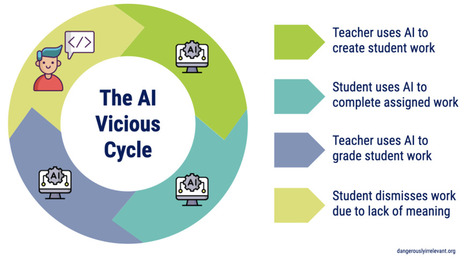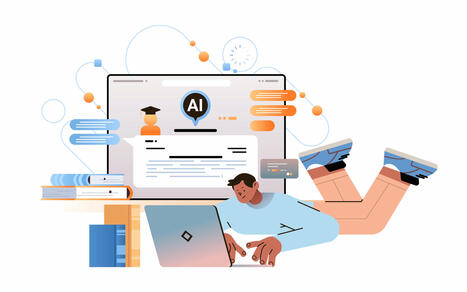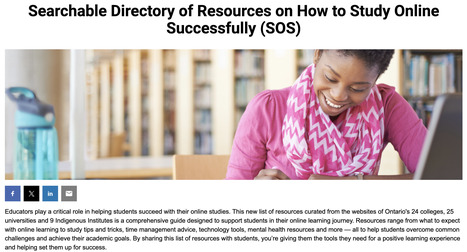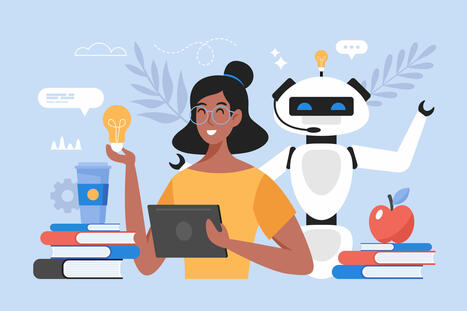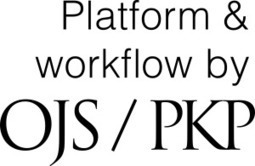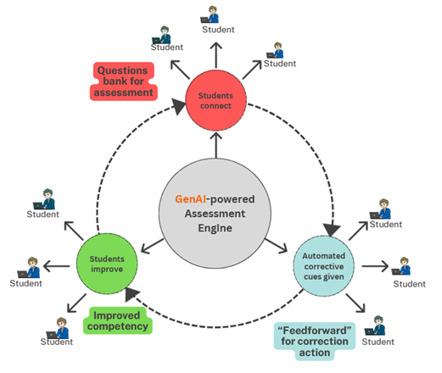This post initiates a nine-article series revisiting the "Teaching AI Ethics" resources from 2023 exploring bias in GenAI.
Get Started for FREE
Sign up with Facebook Sign up with X
I don't have a Facebook or a X account

 Your new post is loading... Your new post is loading...
 Your new post is loading... Your new post is loading...
Two studies show that many college students are offloading higher order thinking to AI, asking chatbots to do hard work for them.
From
teachonline
A flood of AI-generated content It’s a fact that AI is capable of producing convincing and often useful text and other content. Yes, there are concerns about the quality, accuracy and even the environmental impact of that content, but there’s no doubt AI can produce it and that it is already widespread. It is legitimate to ask now whether any piece of content was authored
"The AI Assessment Scale (AIAS) was developed by Mike Perkins, Leon Furze, Jasper Roe, and Jason MacVaugh. First introduced in 2023 and updated in Version 2 (2024), the Scale provides a nuanced framework for integrating AI into educational assessments."
Discover adaptable active learning strategies to boost student engagement in both traditional classrooms and asynchronous online courses.
From
teachonline
"(...) I think challenges around the relevance and value of higher education are going to be compounded by AI. Many tasks performed by people in many jobs are going to be satisfactorily accomplished by AI agents (as we can already see). For example, if you've got a team of salespeople who are doing cold calling, outbound lead generation, you're going to replace most, if not all, of those people with AI agents, as companies are already doing. The whole ecosystem of higher education as we understand it now has to change.
Other parts of the ecosystem are changing dramatically, and ecosystems have to stay in balance or bad things happen. Imagine if higher education hadn’t changed in response to the Internet? Imagine if we still stood in lines with cards to register for classes, etc. I think many people don’t appreciate how much about higher education changed because of the Internet. It will change more because of AI. "
Hey, y’all, I think I have this whole ‘AI in education’ thing figured out. Am I doing this right?
Due to the sheer volume of AI options, pairing high-impact AI tools with highly desirable outcomes aids in the promotion and implementation of such usage in the online classroom.
This article explores AI's historical evolution, critically assesses its benefits and challenges for teaching, and provides evidence-based strategies for faculty to integrate AI effectively.
This free comprehensive guide explores AI’s transformative role across industries, emphasizing the need for AI literacy to remain competitive.
Key sectors include healthcare, engineering, cybersecurity, marketing, and education, with insights into AI-driven automation, predictive analytics, and personalized experiences.
The author highlights essential skills for adapting to AI advancements while addressing ethical concerns and workforce implications.
One common theme throughout our initial conversations about AI with teachers are issues of time. Here, the primary narrative being pushed by school leaders and AI vendors is the idea of AI as a time-saver – taking on the burden of time-consuming but inessential tasks, and thereby ‘freeing up’ teachers “so you've got time to do other things…
Hamilton & Middlebrook: Educators can use artificial intelligence to make tests more learner-centered and personalized, with a whole-child emphasis.
These strategies can make classroom time more engaging and meaningful for students and teachers alike. |
As part of my PhD studies, I read and write a lot of stuff that doesn’t really fit into my research, but which I find interesting anyway. I’m categorising these “spare parts” on my blog, and if you’re interested in following them you’ll find them all here. I’ve written a fair bit about AI ethics, […]
From
teachonline
Educators play a critical role in helping students succeed with their online studies. This new list of resources curated from the websites of Ontario's 24 colleges, 25 universities and 9 Indigenous Institutes is a comprehensive guide designed to support students in their online learning journey.
Given this reality in which AI can provide and synthesize information for and to our students at their requests in seconds, it is not completely paranoid to ask the question, “What can we, as college instructors, offer our students in the age of AI?”
Abstract
From
fltmag
By Roberta Montella and Dan Nickolai, Saint Louis University DOI: https://www.doi.org/10.69732/RVZW4726 One of the most time-consuming tasks of lesson planning is the preparation of pedagogical resources for our language courses. This is especially true when it comes to modifying or
As students and educators adapt to digital platforms, student engagement has emerged as a key concern in online learning. Two such approaches—microlearning and andragogy—offer promising solutions to enhance student engagement and knowledge retention.
"One major complaint about the use of AI to generate articles and answers to real-world questions is that it “hallucinates” — that is, it makes up facts that aren’t true and creates references to articles that don’t exist.
Although AI models like ChatGPT have improved in performing basic mathematics, they can still make errors, especially with more complex calculations. And they sometimes provide information that is imprecise or outdated when answering questions about the world. (...)
The problem today isn’t that we can’t depend on computers. In fact, we can’t depend on any media without a system of fact-checking, critical thinking and trust. The problem is that, up to now, we have been able to depend on computers. And now this trust has been broken. The real question is, how will we get that trust back again?"
"We agree that AI should not be mystified. We agree that students should be taught to question it, prod it, and refuse to treat it like gospel. But here is where I push: it is not just about getting students to “understand” AI. It is about recognizing that AI already understands them — because it has been trained to. And it is already being embedded in schools in ways that make understanding secondary to compliance.
This is not theoretical. This is happening."
PROJECTS > DIMENSIONS OF AI LITERACIES AI Literacies Applied Empirical findings on the appearance of AI literacies shows that they are multidimensional, interconnected, and socioculturally informed. As such, how they show up is dependent upon multiple factors including our roles, environment, and...
Discover how Generative AI can enhance student competency through the assessment flywheel model, providing personalized feedforward comments and automating low-stakes formative assessments for deeper learning.
The promise of ‘labour-saving’ technology is rarely straightforward. While new technologies will often lead to different working conditions, whether or not these equate with better working conditions tends to contestable (especially if we ask the pointed question of ‘better for whom?’). In the education sphere, the past few years have seen growing promises that generative AI…
From
fltmag
By Ilka Kostka, Rachel Toncelli, and Catherine Fairfield, Northeastern University DOI: https://www.doi.org/10.69732/WNWY9538 From “Gotcha” to Guidelines “I’ve been ChatGPT’d!” Any educator who has been teaching during the rise of generative artificial intelligence (GenAI) knows what this phrase means. When we |










